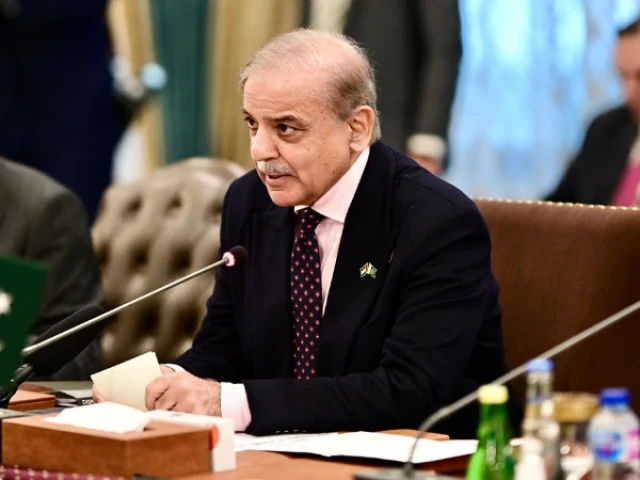Shehbaz stresses that Pakistan can not afford another season of preventable disaster
ISLAMABAD:
With monsoon devastation now a yearly certainty, Prime Minister Shehbaz Sharif on Wednesday instructed federal and provincial authorities to launch early preparations for the 2026 season, ordering immediate implementation of the climate change ministry’s short-term resilience plan as winter settles across the country.
Chairing a high-level meeting, the prime minister stressed that Pakistan could not afford another season of preventable disaster and asked all relevant institutions to integrate their planning, data, and response mechanisms.
He approved the ministry’s short-term plan and instructed the Ministry of Climate Change, the Ministry of Planning and the National Disaster Management Authority (NDMA) to work in close coordination with provinces for integrated planning on climate change.
He also called for preparations to convene a meeting of the National Water Council (NWC) for national-level water management planning.
PM Shehbaz said that as a developing country, Pakistan was forced to repeatedly divert a substantial portion of its GDP to counter climate-induced damages, resources that could otherwise be used for development.
He added that Pakistan continued to suffer the “severe consequences of climate change despite contributing almost negligibly to global carbon emissions”.
Federal ministers Ahsan Iqbal, Ahad Khan Cheema, Muhammad Aurangzeb, Dr Musadik Malik, Ataullah Tarar and senior officials were briefed on international weather forecasts, monsoon indicators, and short-, medium- and long-term preparedness plans.
Federal Minister for Climate Change Dr Musadik Malik later told reporters that the federal and provincial governments would integrate all disaster early-warning systems at district and tehsil levels under a 250-day short-term plan, enabling timely evacuation and movement of assets.
He said that the unified system would ensure local officials respond “within a critical window of time” to reduce losses during next year’s monsoon.
Sharing details of the meeting chaired by the prime minister, Dr Malik said all categories of climate threats, including riverine flooding, hill torrents, urban flooding and coastal impacts, had been reviewed, and a national resilience roadmap approved.
He noted that Pakistan currently operates multiple fragmented early-warning systems that cause delays and confusion.
The prime minister had therefore ordered consolidation of all datasets and their display on real-time screens in the offices of assistant commissioners and deputy commissioners. “The first alarm will ring at the tehsil and district levels – not in Islamabad,” he said.
NDMA Chairman Lt Gen Inam Haider Malik also warned that Pakistan is likely to experience 22 to 26 per cent above-normal rainfall during the 2026 monsoon season, with weather extremes intensifying.
He said 3.1 million people had been moved to safety during this year’s monsoon, and stressed that both federal and provincial authorities bore major responsibility for disaster management.
He warned that tourism in northern areas would likely be restricted in June and July to prevent losses. Pakistan’s early-warning system alerts provinces “six to eight months in advance,” he said, adding that weekly alerts would enable more effective precautions.
He confirmed that PM Shehbaz had approved the short-term mitigation plan and directed immediate implementation, along with coordinated climate-related planning with provinces.

